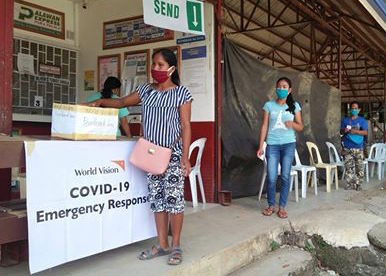World Vision provides cash assistance to families affected by COVID-19 Pandemic
To augment the continuing government efforts to assist coronavirus-affected families, especially those with severely acute or moderately acute malnourished children and those with family members who belong to the vulnerable sectors, World Vision commenced its unconditional cash transfer (UCT) project. The organization allotted a budget of Php15Million to assist 15,000 families from select-cities and provinces with Php1000 each.
The Story of Two Mothers

Ellyn, a 24-year-old mother of two, lives in Siayan, Zamboanga del Norte.
Her husband got stranded in Manila where he works as a security guard. Due to the enforced community quarantine, Ellyn says her husband could hardly send money to support the family.
While on quarantine, Ellyn and her two children relied mostly on their remaining crops like corn, for daily sustenance.
“We plant corn and that is what I feed my family,” explains Ellyn, adding that it’s not enough for her growing children, aged 5 and 2. With very little means to keep the family afloat, Ellyn is forced to solicit help from her relatives.
The same is true for the family of Maridel, a 36-year-old housewife and mother of four. Her husband, Renante, is a farmer.
“Because of the quarantine, it is hard to sell our crops. It is also summer, so we don’t get rain and it has affected our harvest,” Maridel shares. Even with their small backyard farm, she says there are days when they barely have anything to eat.
Ellyn and Maridel are just two of the 650 beneficiary families from eight barangays in Zamboanga del Norte.
“Claiming the cash assistance was easy and fast,” says Ellyn of the cash distribution. “There were only a few requirements and we only had to fill out a form and wait for their call.” With the PHP 1,000 she received, she bought food and fruits for her children.
“This is a huge help for us, we are very grateful,” adds Maridel, who bought 5 kilos of rice and vegetables.

Maximizing partnerships, digital technology
World Vision partners with barangays, local government units, and financial service providers, to ensure the orderly and efficient distribution of cash to its beneficiaries.
“World Vision has been working in Zamboanga del Norte even before this crisis and we can say that we have established partners in the area. This allowed us to effectively facilitate relief operations and other programs, such as the UCT, by mobilizing volunteers and other partners,” says World Vision’s Humanitarian and Emergency Affairs Director Ajab-Aram Macapagat.
“Likewise, forging partnerships with financial service providers like Palawan Express Pera Padala even before an emergency strikes is proven effective. Like in other emergency responses we’ve done before, we are able to immediately process the cash transfer because of this already existing partnership,” he adds.
Mindful of ensuring physical distancing, World Vision maximizes the use of digital technology for its emergency response.
With the help of community volunteers, the most vulnerable families are efficiently identified, listed and submitted to barangay officials for confirmation.
Beneficiaries’ names are then encoded into WV online system called the Last Mile Mobile Solutions (LMMS). LMMS is a technology solution used to record beneficiaries and help manage distribution data. This strengthen the efficiency, effectiveness and accountability of humanitarian service delivery. The system is also used by World Vision and other humanitarian organizations worldwide to enhance emergency response.
World Vision coordinates with Palawan Express Pera Padala (PEPP) for the processing of cash transfer. PEPP provides World Vision unique codes for each beneficiary to claim the cash assistance from branch nearest to their community. Another round of phone call is done to give the code to each beneficiary. Community volunteers in coordination with World Vision staff on field ensure that there is assigned schedule for beneficairy claimants to ensure physical distancing.
“We recognize that many of our kababayans, especially in the rural setting, are daily-wage earners who now have little or no income because of the ECQ. While it is beneficial to distribute relief goods, we know that cash is also essential at this time so they can purchase what their families truly need,” says Macapagat.
After Zamboanga del Norte, a total of 16 more cities and provinces are expected to receive their cash assistance from World Vision until May 31.









